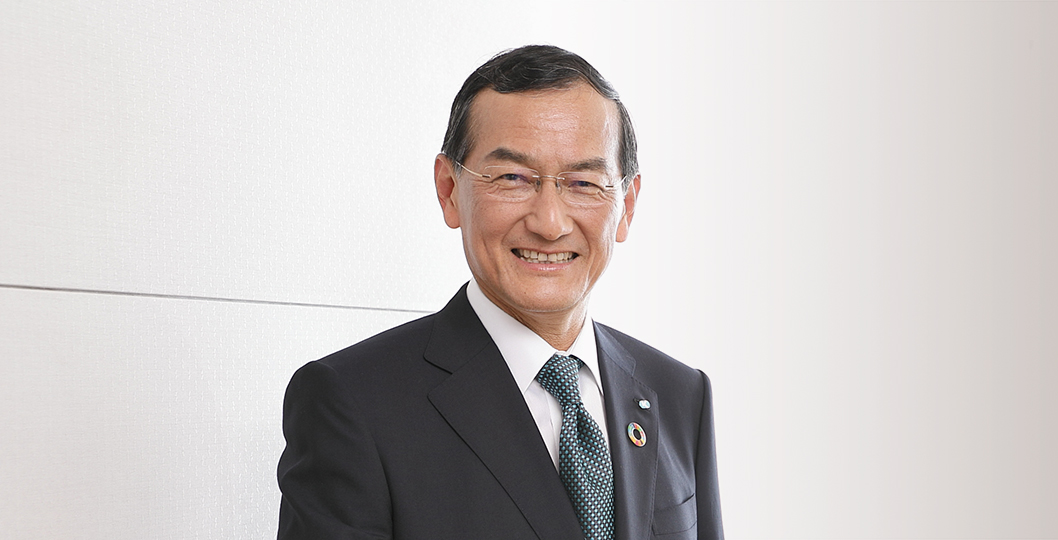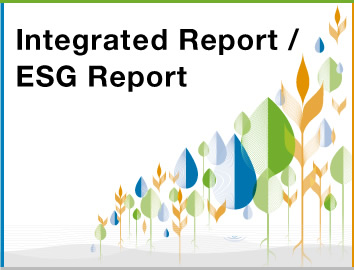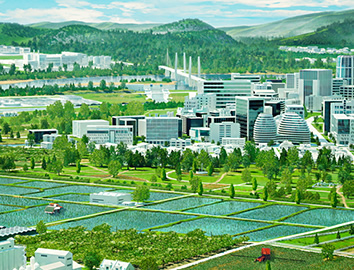Initiatives through Business: Food
More efficient farming, for abundant and stable production of food

Ever since its earliest days, Kubota’s products and services have improved agricultural efficiency and productivity, supporting farming in many countries throughout the world. Over the last few years, we have actively promoted smart agriculture, using advanced information and communications technologies, as well as robotics, to rationalize work and enhance harvest quality. Our total solutions offer advantages for food production to farm business, and to expanded sales channels, helping ensure abundant and stable food production, with the goal of attaining prosperous food and lives for everyone.
Kubota’s initiatives to the global food challenge
Forecasts Indicate Insufficient Food Resources and Fewer Agricultural Workers, Worldwide
-
The world’s population is heading toward 10 billion. Concerns of a global food shortage
A United Nations forecast states that, while in 2022 the global population was 8 billion, it will likely rise to 9.7 billion by 2050, and 10.4 billion by 2100.*1 Due to this population increase and further economic growth, in 2050 global food demand is predicted to be 1.7 times greater than in 2010.*2 Another report estimates that between 713 and 757 million people — about one person in eleven globally — do not have enough food to eat.*3 One of the United Nations’ Sustainable Development Goals (SDGs) calls for improved nutrition and the end to hunger throughout the world. This will require the promotion of sustainable agriculture on a global scale, with a reduction in food loss and waste.
- *1.World Population Prospects 2022, United Nations
- *2.Global Demand for Food in 2050 (September 2019), Japan’s Ministry of Agriculture, Forestry and Fisheries
- *3.The Sustainable Development Goals Report 2024, United Nations
-
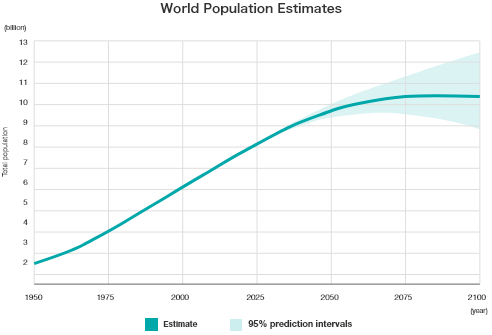
Enlarge
-
A growing need for agricultural efficiency and higher productivity
Aging farming populations and labor shortages are worldwide issues in agriculture. In Japan, 1.78 million core persons mainly engaged in farming in 2012,*1 but only 1.23 million in 2022.*2 Of the latter number, eight hundred sixty thousand (about 70%) were age 65 or older.*2 The average age being 68.*2 The total number of people employed in agriculture is declining in many countries.*2 And yet, at the same time worldwide grain consumption is trending upward, due to a growing population in developing countries and rising income levels. Thus, with fewer workers and a greater need for more farmed land, the world is facing a growing demand for agricultural efficiency and better productivity.
- *1.Agricultural Labor Statistics, Japan’s Ministry of Agriculture, Forestry and Fisheries (2012 data)
- *2.Agricultural Labor Statistics, Japan’s Ministry of Agriculture, Forestry and Fisheries (2022 data)
- *3.Employment in Agriculture, The World Bank (January 2021 data)
-
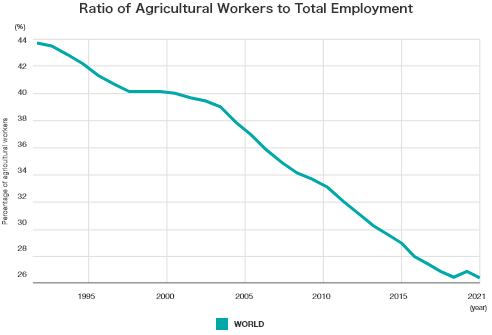
Enlarge
Initiatives through Business in food
Aiming for Stable Food Production and Greater Farm Efficiency
-

-
From production to farming and expanded sales channels, aiming for sustainable agriculture with comprehensive solutions
When developing and manufacturing products, Kubota applies a hands-on approach, taking into account local farm circumstances. Kubota products and technologies for rice farming were developed in Japan, a rice growing country, and now they are supporting improve productivity in other Asian countries dealing with farm labor shortages. In Africa, where demand for rice is growing rapidly, Kubota is promoting the phased-in introduction of farm machinery, which has been adapted to local farm work conditions. And in Europe and the United States, where digital technology is being adopted to farming, we are gathering information on the varying needs, aiming to develop farm machinery that works well with local techniques. In these ways we continue to support local farming in many parts of the world. Over the last few years, our strong support for farm business strategies embraces new models for higher harvest quality and reduced workload. Another initiative we support is expanding sales channels. Kubota provides solutions for sustainable agriculture, since we believe that farming is a long process that begins before production and ends after it.
-

-
ICT and robotics for precision, labor-saving, and reduced environmental impact
Worldwide challenges facing agriculture today include aging farming populations, the need for appropriate management and operation due to upscaled farm size, and the need to improve quality and productivity, and dealing with increased environmental impact and food loss. Kubota’s solutions to these challenges use information and communications technologies (ICT) and robotics to promote dramatic labor-saving automation. We also gather and apply data to achieve precision farming that leads to more efficient production and look for ways to optimize agricultural chemical and fertilizer use. Kubota is already providing products and solutions in Japan for smart agriculture. Kubota’s Agri Robo series machinery for automating complex tasks includes tractors, rice transplanters, and combine harvesters. And our ICT platform — called the Kubota Smart Agri System (KSAS) — supports efficient farming by transmitting harvest and farm work data to the cloud, for integrated management. Our support extends to total solutions for a wide range of tasks in agriculture, even for the remote or automatic control of water supply and drainage of cultivated land, through IoT. Kubota will contribute to sustainable agriculture by transferring these new, developed-in-Japan farming techniques to other parts of the world, adapting them to local needs.
Global case studies in food-related initiatives
Enriching the Food Supplies Worldwide
Aiming for a World where People Live in Health and Abundant Food
Working for attainment of the 17 goals of United Nations SDGs that aim to transform our world
At the end of a United Nations Summit meeting in 2015, the Sustainable Development Goals (SDGs) were promulgated, listing 17 common goals for the international community. Kubota has identified two of these goals — Zero Hunger, and No Poverty — as areas where the Kubota Group is especially well positioned to contribute to improving food-related conditions.
Economic growth has brought prosperity to many people in the world, although 820 million of them — about one person in nine — suffer from chronic malnutrition because they still do not have enough to eat.* Kubota will continue to promote sustainable agriculture, providing agricultural machinery that suits the conditions of the country where it will be used, aiming for a future where people in the world enjoy healthy and abundant food.
* Source: 2019 - The State of Food Security and Nutrition in the World, Food and Agriculture Organization (FAO) of the United Nations
Kubota’s ESG Management
Aiming for sustainability and achievement of our long-term vision
-
K-ESG Management and Materiality
In line with its aim to maintain itself as a sustainable company, Kubota is promoting K-ESG Management, centered on its own ESG measures. With a focus on the four areas and 12 points of materiality, we aim to enhance our corporate value and realize our long-term vision GMB2030.
-
Top Message: Sustainability
Aiming to become an “'Essentials Innovator for Supporting Life,' Committed to a Prosperous Society and Cycle of Nature,” we will promote Kubota’s own style of ESG Management, thereby contributing to sustainability through the resolution of issues related to food, water, and the environment.

